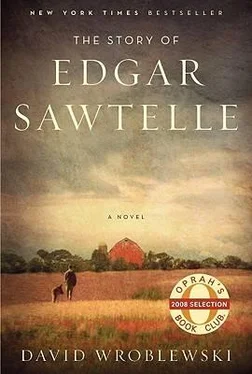They both lied.
Each night Edgar lay awake, ridiculously tormented by the windup clock, which, along with its ticking, issued a ratcheting, grinding noise he’d never noticed before. When he finally managed to sleep, his father appeared beside his makeshift bed, so close and real Edgar didn’t believe he was dreaming until he found himself sitting up and Almondine licking his face. The fourth morning, he fumbled the jangling alarm into silence and promptly fell back into slumber, worrying even then that he might dream of his father again. And worrying equally that he might not. Instead, he dreamed he could breathe words effortlessly into the air. The ability hadn’t just appeared, it had returned, as if he’d had a voice in the womb but lost it when he’d entered the world. And in his dream, he had chosen not to speak into the telephone, not to summon the ambulance that would have saved his father’s life.
He woke frantic, sobbing. It took a moment before he could marshal the courage to draw a breath, shape his lips, and exhale.
Silence.
The awful thing was, his voice sounded all wrong in his dream-low, like his father’s, and gravelly. But any voice coming from inside him would have sounded wrong, no less than the buzzing-fly noise from the flashlight-shaped thing the doctors had pressed against his neck. That had given him a voice, but it hadn’t been worth it. Unless, of course, he’d had it the day his father fell down in the barn.
He began to take shortcuts with the kennel routine. In order to train all the dogs, he raced through the chores. He found he could clean three or four pens while he fed the dogs if he dumped a pile of food on the cement. Something told him this was a bad idea, but it worked. At night the dogs seemed edgy but that was because the schedule had changed-no one slept in the kennel night after night, much less ran down the aisle and threw open the their pen doors to let them race after tennis balls. The late-night training, he told himself, was excellent proofing practice.
It was past midnight on the fourth day when he finally stretched out on the bales and pulled the blankets over him. He’d turned out all the lights and settled himself beside Almondine when he heard his name spoken in a distinct, feminine voice. He sat up and listened. It had only been the squeak of the heater fan, he decided. A few minutes later, a thought began to nag at him: What if it hadn’t been the heater fan at all? What if his mother was standing on the back porch, calling? He cast off his blanket and threw open the barn doors but all he saw was a barren yard and the porch standing dark and empty.
IN SOME WAYS, TRUDY THOUGHT, it would have been better if the antibiotics had made her downright sick. As it was, she lay in bed, chilled one moment, boiling the next. She was indifferent to food, though she forced herself to eat. On the third day she’d called Doctor Frost’s office as promised, hoping she was saying what he wanted to hear. She was tired, she told him, but not feverish. She was sleeping a lot. That was normal, Frost said. She should beware of dehydration, be careful not to skip doses of the antibiotics. They talked briefly about Edgar. She told the doctor he showed no sign of a cough. Did she think she could drive into town at the end of the week? Was her cough still productive? And so on. She didn’t mention that she grew sickeningly dizzy whenever she stood, or that she’d been so foggy-minded she’d forgotten his phone number twice while dialing. And she might have stretched the truth about the fever. But she kept focused long enough to maintain the conversation, which felt like a triumph.
Afterward she fell back into bed. Was it time for her next set of pills? Or had she taken them? One late afternoon had begun to look much like the next, but she was sure she had taken the pills before she called Frost. The antibiotics made her terribly sleepy. She recalled Edgar standing in the bedroom doorway, telling her that things were going smoothly in the kennel. He’d grown so serious since his father’s death.
She rolled over. Sleep was the important thing. The way these things worked, tomorrow she would wake up on the other side of it. The fever would have broken, and she would sit up, read a bit, make some phone calls. Get on top of the paperwork.
She took the vial of pills from the dresser and shook them onto the blanket and counted them. It was surprising. So many left.
ON THE FIFTH EVENING, Edgar slipped into the house, checked on his mother, and ate dinner. After washing dishes, he and Almondine walked to the barn to do the chores, but when they got there, exhaustion settled on him like a lead blanket. The straw bales felt luxurious, the pillow soft as a cloud, and for the first night in a long time, there were no dreams. He awoke with Almondine breathing in his face. The windup alarm clock said two o’clock. He sat up and rubbed a hand across his face. There was something wrong with that. He hadn’t done the evening chores.
He could get away with leaving everything else until morning, but he didn’t like the idea of leaving the dogs without water, and as long as he was going to do that, he could feed them, too. He scooped a mound of kibble into the middle of the aisle and filled a bucket of water from the tap in the medicine room. When he threw open their doors, his litter bounded into the aisle, bumping his legs and dashing for the food. He’d piled up enough for all the dogs, not just three or four pens’ worth, and he needed to get them out fast so that the first ones didn’t gorge themselves and leave the last ones hungry. By the time he’d gone down the aisle, eighteen dogs were scrambling over the cement floor, jockeying for position. Edgar stepped into a pen and began to fill the water trough.
He never saw what started the fight. There was a yelp, and from the corner of his eye he saw a dog leap into the air. Finch. He dropped the pail of water and stepped into the aisle and that was all the time it took for him to realize the enormity of his mistake. One dog in motion at a time, his mother had said. It was one of many rules in the kennel, rules that didn’t always make sense, or even seem important, until some situation drew the lesson out.
Finch landed and nosed his right hind leg and turned back to the mass of dogs, head lowered, grimacing nastily to show his teeth. He spun to face one of the older females, a dog named Epi, dominant in her litter, bigger than Finch, and not in the least fearful.
In all his life, Edgar had seen only one real dog fight. That had been broken up when his parents sprayed water on the antagonists, hauling them away by their tails. Later, his father said a person never, ever reached between fighting dogs. To make his point, he’d pulled up his sleeve and shown Edgar the puckered scar running along the axis of his forearm, jagged and shiny. A dog in a fight will bite before it realizes what it’s doing, he’d said. It won’t mean to hurt you, but it will see motion and react.
Some of the dogs were backing away from Finch and Epi, hackles raised. Edgar clapped his hands, grabbed two dogs, and hauled them into the nearest pen. Then another two. The noise had grown instantly deafening. He kenneled Tinder, Essay, and Pout. Baboo had already retreated to his run; Edgar shoved Opal and Umbra in after him and ran down the aisle wrestling dogs into their pens one after another and slinging shut the doors.
When he turned, only three dogs remained in the kennel aisle: Finch, Epi, and Almondine. Finch lay on his back. Epi stood over him, jaws buried in the fur at the base of his throat. On her muzzle there was a smear of red. Finch alternately lay limp and struggled to escape. A pace away, Almondine stood with her lips raised, growling, but the moment she stepped forward, Epi released Finch and lashed her muzzle toward Almondine, ears flattened. Almondine jerked her head away but stood her ground.
Читать дальше
Конец ознакомительного отрывка
Купить книгу












